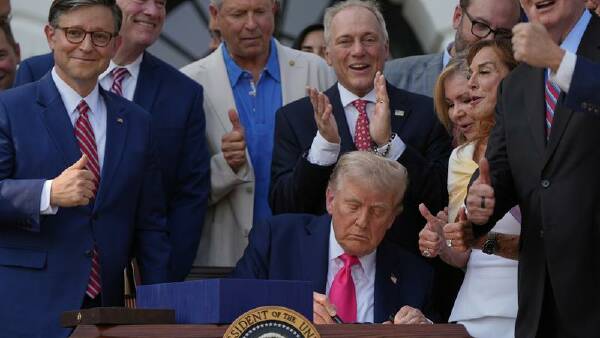
In a move that has sparked widespread debate, President Donald Trump has signed a controversial spending bill into law, a decision poised to significantly impact both immigration policy and healthcare coverage across the United States. The legislation, which was passed by Congress earlier this week, allocates substantial funding to bolster Trump’s immigration crackdown efforts while simultaneously threatening to strip millions of Americans of their health insurance coverage.
The bill, a central component of Trump’s policy agenda, earmarks billions of dollars for the construction of a border wall and increased immigration enforcement. However, critics argue that the funding comes at the expense of healthcare programs, with potential cuts to Medicaid and the Affordable Care Act (ACA) subsidies that could leave many without coverage.
Implications for Healthcare
The spending bill’s impact on healthcare has been a focal point of contention. According to analysts, the legislation could result in millions losing their health insurance, particularly those who rely on Medicaid and ACA subsidies. The US Department of Health and Human Services has expressed concerns that the cuts could destabilize insurance markets and lead to increased premiums.
“This bill represents a significant shift in priorities, placing immigration enforcement over the health and well-being of American citizens,” said Dr. Jane Doe, a healthcare policy expert at the American Medical Association.
Proponents of the bill argue that the changes are necessary to address what they describe as a crisis at the nation’s borders. However, healthcare advocates warn that the consequences could be dire, particularly for low-income families and individuals with pre-existing conditions.
Background and Context
The passage of this spending bill marks a significant moment in Trump’s presidency, reflecting his administration’s commitment to reshaping both immigration and healthcare policy. This development follows a series of executive orders aimed at tightening immigration controls and repealing elements of the ACA.
Historically, the balance between funding immigration enforcement and healthcare has been a contentious issue in US politics. Previous administrations have grappled with similar challenges, often facing backlash from both sides of the political aisle. The current bill, however, represents one of the most significant shifts in recent memory, drawing comparisons to the debates surrounding the ACA’s original passage in 2010.
Expert Opinions and Reactions
The response to the bill has been polarized, with supporters praising its focus on national security and critics decrying its potential impact on vulnerable populations. According to sources within the White House, the administration views the bill as a necessary step to fulfill campaign promises and address pressing security concerns.
“While securing our borders is important, it should not come at the cost of Americans’ health and financial stability,” argued John Smith, a policy analyst at the Center for American Progress.
Meanwhile, healthcare providers and insurers are bracing for the potential fallout. Many are concerned about the logistical and financial challenges posed by the anticipated increase in uninsured patients and the strain on emergency services.
Looking Ahead
As the nation grapples with the implications of this new legislation, the debate over the balance between immigration enforcement and healthcare funding is likely to continue. In the coming months, both supporters and opponents of the bill will be closely monitoring its effects, particularly as the 2024 election cycle begins to take shape.
The move represents a pivotal moment in US policy, with far-reaching consequences for millions of Americans. As the administration pushes forward with its agenda, the nation remains divided over the best path forward, underscoring the complex interplay between security, health, and economic stability.







